Related Research Articles
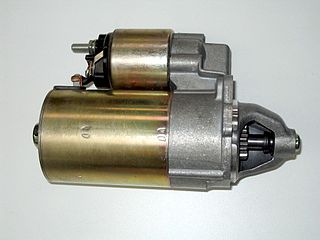
A starter is a device used to rotate (crank) an internal-combustion engine so as to initiate the engine's operation under its own power. Starters can be electric, pneumatic, or hydraulic. The starter can also be another internal-combustion engine in the case, for instance, of very large engines, or diesel engines in agricultural or excavation applications.

Jaguar is the luxury vehicle brand of Jaguar Land Rover, a British multinational car manufacturer with its headquarters in Whitley, Coventry, England. Jaguar Cars was the company that was responsible for the production of Jaguar cars until its operations were fully merged with those of Land Rover to form Jaguar Land Rover on 1 January 2013.
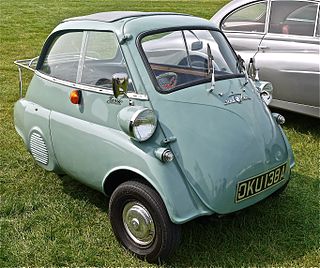
The Isetta is an Italian-designed microcar built under license in a number of different countries, including Argentina, Spain, Belgium, France, Brazil, Germany, and the United Kingdom. Because of its egg shape and bubble-like windows, it became known as a bubble car, a name also given to other similar vehicles.

A milk float is a vehicle specifically designed for the delivery of fresh milk. Today, milk floats are usually battery electric vehicles (BEV), but they were formerly horse-drawn floats. They were once common in many European countries, particularly the United Kingdom, and were operated by local dairies. However, in recent years, as the number of supermarkets, small independent grocers and petrol stations, and convenience stores stocking fresh milk has increased, many people have switched from regular home delivery to obtaining fresh milk from these other sources.
Coventry Victor was a British motorcycle and car manufacturer. Originally Morton & Weaver, a proprietary engine manufacturer in Hillfields, Coventry, founded in 1904, the company changed its name to Coventry Victor Motors in 1911. The company closed in 1971.
Sharps Commercials Ltd was a British car maker based in Preston, Lancashire. It was founded in 1922 by Paul Sharp. It changed its name to Bond Cars Ltd in 1963. The company was taken over by the Reliant Motor Co Ltd of Tamworth, Staffordshire in February 1969, who eventually closed the Preston factory at the end of July 1970, transferring the spare parts business for the Bond Minicar, 875 saloon, 875 Ranger van and Equipe models to a firm called Bob Joyner & Son in Oldbury in the English Midlands. Reliant nevertheless continued to use the Bond name until 1974 on Bond Bug models made at their own Tamworth plant.
Siba or SIBA may refer to:
Metropolitan-Vickers, Metrovick, or Metrovicks, was a British heavy electrical engineering company of the early-to-mid 20th century formerly known as British Westinghouse. Highly diversified, it was particularly well known for its industrial electrical equipment such as generators, steam turbines, switchgear, transformers, electronics and railway traction equipment. Metrovick holds a place in history as the builders of the first commercial transistor computer, the Metrovick 950, and the first British axial-flow jet engine, the Metropolitan-Vickers F.2. Its factory in Trafford Park, Manchester, was for most of the 20th century one of the biggest and most important heavy engineering facilities in Britain and the world.
Lucas Industries plc was a Birmingham-based British manufacturer of motor industry and aerospace industry components. Once prominent, it was listed on the London Stock Exchange and was formerly a constituent of the FTSE 100 Index. In August 1996, Lucas merged with the American Varity Corporation to form LucasVarity.

JA Prestwich Industries, was a British engineering equipment manufacturing company named after founder John Alfred Prestwich, which was formed in 1951 by the amalgamation of J.A.Prestwich and Company Limited and Pencils Ltd.
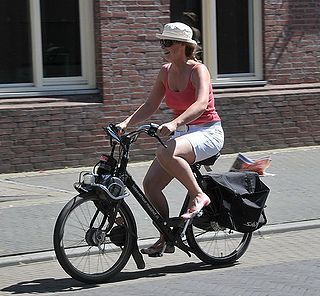
A motorized bicycle is a bicycle with an attached motor or engine and transmission used either to power the vehicle unassisted, or to assist with pedalling. Since it sometimes retains both pedals and a discrete connected drive for rider-powered propulsion, the motorized bicycle is in technical terms a true bicycle, albeit a power-assisted one. Typically they are incapable of speeds above 52 km/h (32 mph), however in recent years larger motors have been built, allowing bikes to reach speeds of upwards of 72 km/h.
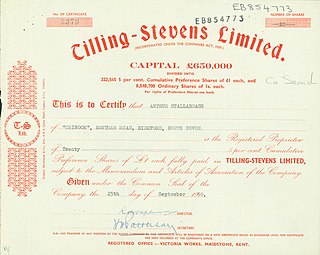
Tilling-Stevens was a British manufacturer of buses and other commercial vehicles, based in Maidstone, Kent. Originally established in 1897, it became a specialist in petrol-electric vehicles. It continued as an independent manufacturer until 1950, when it was acquired by the Rootes Group.
Dick, Kerr and Company was a locomotive and tramcar manufacturer based in Kilmarnock, Scotland and Preston, England.

Bond Minicar is a series of economical three-wheeled microcars which were manufactured by the British car manufacturer Sharp's Commercials Ltd, in Preston, Lancashire, between 1949 and 1966.
The history of the motorcycle begins in the second half of the 19th century. Motorcycles are descended from the "safety bicycle," a bicycle with front and rear wheels of the same size and a pedal crank mechanism to drive the rear wheel. Despite some early landmarks in its development, the motorcycle lacks a rigid pedigree that can be traced back to a single idea or machine. Instead, the idea seems to have occurred to numerous engineers and inventors around Europe at around the same time.

A car or an automobile is a motor vehicle with wheels. Most definitions of cars say that they run primarily on roads, seat one to eight people, have four wheels, and mainly transport people, not cargo.

A scooter is a motorcycle with an underbone or step-through frame, a seat, and a platform for the rider's feet, emphasizing comfort and fuel economy. Elements of scooter design were present in some of the earliest motorcycles, and motor scooters have been made since at least 1914.
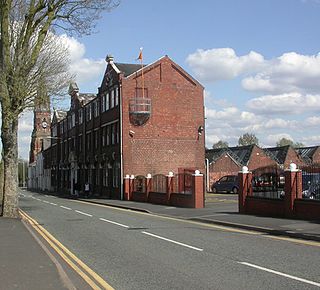
Sunbeam Commercial Vehicles was a commercial vehicle manufacturing offshoot of the Wolverhampton based Sunbeam Motor Car Company when it was a subsidiary of S T D Motors Limited. Sunbeam had always made ambulances on modified Sunbeam car chassis. S T D Motors chose to enter the large commercial vehicle market in the late 1920s, and once established they made petrol and diesel buses and electrically powered trolleybuses and milk floats. Commercial Vehicles became a separate department of Sunbeam in 1931.
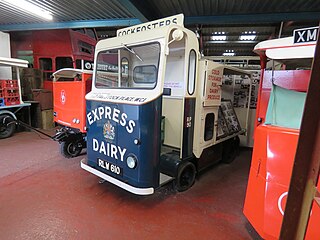
Helecs was a marque of British battery-electric road vehicles, produced initially by the electrical engineers Hindle Smart Co Ltd of Ardwick, Manchester from 1948 onwards. One of their first vehicles was a collaboration with Jensen Motors for a tractor unit, used primarily for railway deliveries, and they then produced a number of vehicles which were aimed at the dairy industry and bodied as milk floats for retail milk delivery. They had some success with exports to Canada, and two independent companies bearing the Helecs Vehicles name were set up, in 1952 and 1955. All of the companies became insolvent in 1956. One of the vehicles for which they built the chassis is on public display at The Transport Museum, Wythall.
References
- ↑ Read, C.P (21 August 1958). "A factory in a garden". Motor Cycling. London: Temple Press Ltd. 98 (2527): 512–513.
- ↑ "Servicing data sheet No 13-2 Siba Dynastart". Motor Cycle Trader. London: Iliffe Specialist Publications Ltd. 25 June 1965.
- ↑ "Siba Electric". Grace's Guide. 2011. Retrieved 16 August 2011.
- ↑ "116. SIBA Electric Ltd" (PDF). Report on the Supply of Electrical Equipment for Mechanically Propelled Land Vehicles. HC 21, 1963-64. The Competition Commission. 18 December 1963. p. 41. Archived from the original (PDF) on 26 July 2011. Retrieved 16 August 2011.
